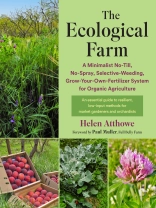The breakthrough resource for fruit and vegetable growers at every scale who want to go ‘beyond organic’ and build higher soil quality and fertility using fewer inputs through a unique ecosystem-balancing approach
“Atthowe’s book takes ecological farming to the next level. It is packed with useful, field-tested, innovative techniques for farming more gently without sacrificing productivity. . . This is the future of farming. I highly recommend this book.”—Ben Hartman, author of The Lean Farm
The Ecological Farm is the go-to guide for ecological growing, with a unique focus on reduced tillage, minimizing farm and garden inputs, and pest control.
Reflecting the wisdom that farmer, consultant, and educator Helen Atthowe and her late husband, Carl Rosato, gained during decades of farming experience, this book guides readers on how to reduce or eliminate the use of outside inputs of fertilizer or pesticides—even those that are commonly used on certified organic orchards and market gardens. In clear language and with color photographs, charts, and graphs throughout, the book emphasizes the importance of managing the details of an entire growing system over the full life of the enterprise.
Based on advances in scientific research in ecological food production, farmers, homesteaders, permaculturists, and gardeners alike will learn methods to:
- design a farm system that maintains a growing root in the soil year-round to feed the microbial community instead of just crops.
- strengthen the “immune system” of a farm or garden
- supply crop needs using only on-farm inputs such as cover crops and living mulch
- maximize the presence of beneficial insects and microbes that support healthy crop development
- minimize ecological impact in dealing with insect pest and disease problems
The Ecological Farm also features a crop-by-crop guide to growing more than 25 of the most popular and profitable vegetables and fruits, including specific management advice for dealing with pests and diseases.
The Ecological Farm makes complex, sometimes messy, ecological concepts and practices understandable to all growers, and makes healthy farming—in which nature is invited to participate—possible.
‘[This book] will guide all of us as we learn to farm in harmony with an ecosystem and to become obedient to the whole rather than being distracted by the urge to tinker with the parts.”
—Wes Jackson, cofounder and president emeritus, The Land Institute
关于作者
Helen Atthowe has worked for 35 years to connect farming, food systems, land stewardship, and conservation. She farmed and conducted research at Woodleaf Farm in eastern Oregon until spring 2023, when she moved to western Montana. She is helping the new owners of the Oregon farm learn her ecological management system as she simultaneously begins a new Woodleaf Farm in Montana, where she has already planted a no-till orchard of thirty fruit trees. Helen and her late husband, Carl Rosato, co-owned and operated a certified organic orchard in California where they pioneered methods for raising apples, peaches, and other tree fruits without the use of any type of pesticides. Her on-farm research includes ecological weed and insect management, organic minimum soil disturbance systems for vegetable and orchard crops, and managing living mulches for soil and habitat building. She is a contributing writer to The Organic Gardener’s Handbook of Natural Pest and Disease Control and other books. She has served as a board member for the Organic Farming Research Foundation and advisor for the Wild Farm Alliance. Atthowe has a master’s degree in horticulture from Rutgers University and has worked in education and research at the University of Arkansas, Rutgers University, and Oregon State University, and served as a horticulture extension agent in Montana, where she annually taught an organic master gardener course.












